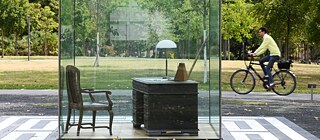Frankfurt School
Conceiving a New Society

The Institute for Social Research (IfS), known internationally as the “Frankfurt School”, was founded a hundred years ago. Its most seminal thinkers still inform our conception of society today. What may well be their most important legacy is their contention that a different world is possible.
By Wolfgang Mulke
In the spring of 1923, a research centre was founded in Frankfurt am Main that would leave its mark on left-wing social theory around the world to this day: the Institut für Sozialforschung – Institute for Social Research – or IfS for short. It brought together a group of thinkers whose works and ideas have been taught at length to one generation of students after another in the social sciences ever since, including first and foremost Theodor W. Adorno as well as Max Horkheimer, who took over as director of the institute around 1930, the cultural theorist Walter Benjamin, the social psychologist Erich Fromm and the sociologist Herbert Marcuse. Their most important legacy is their contention that another world is possible – and their insistence on continually questioning our form of society.
Marxism Research Instead of National Socialism
A hundred years ago, when the IfS was founded as an independent research institute of the Goethe University Frankfurt, those were troubled times. Nazism was already on the rise in the shadow of the Weimar Republic: Adolf Hitler had been appointed leader of the Nazi party two years earlier, and fierce battles were to break out in the streets between Communists and National Socialists just a few years later. This was the backdrop to the political orientation of the IfS: privately funded with an endowment from Felix Weil, an avowed Marxist, it was established to do research on the labour movement and to challenge capitalist society. Specifically, it was to develop Marxist theories – on a scientific basis, and independently of the current powers that be.
But that orientation was to shift over the next few years from orthodox Marxism to an interdisciplinary sociological and philosophical form of social criticism in general: a critical investigation of capitalism, rational behaviour and why people succumb to the appeal of fascist ideologies. This critique was not in line with the current political situation, which is why the leading lights of the fledgling IfS couldn’t stay in Frankfurt for long. Shortly after Hitler came to power, the institute was closed down on the grounds of “subversive activities”. Most of the faculty members, many of them Jews, emigrated to the US and re-established the IfS at Columbia University in New York. Adorno and Horkheimer eventually returned to Frankfurt in 1949 – and brought the Institute back with them.
Critical Theory: Analysis of Power Relations
In the meantime, “Critical Theory”, first set forth in a 1937 essay by Horkheimer, had promptly been taken up by the other members of the Frankfurt School and, subsequently, by the social sciences at large. Critical Theory is essentially an interdisciplinary social critique that goes beyond Marxist dogmas of political economy to include socio-psychological issues, for example. In our day, this approach might be described as a holistic critique of social domination.
In our day, this approach might be described as a holistic critique of social domination.
Critical Theory was enjoyed a heyday during the student uprisings in the late 1960s: most of the protestors embraced an undogmatic form of Marxism. But the IfS intellectuals were put off by the movement’s revolt against mainstream society, and especially by some elements within the movement that advocated violent revolution. And yet, the objectives of the two groups were quite compatible: to account for Nazi atrocities and liberate society from capitalist domination. It was during this period that the social philosopher Jürgen Habermas rose to the intellectual forefront of the second generation of the Frankfurt School. To this day, Habermas, who is now over 90 years old, is still bringing his social critique to bear in the public debate.
Market, Community and the Common Good
The Frankfurt School researchers covered many different subjects, including culture and the arts, literature and music, politics and science. One key aspect of their work was a critique of the dominant culture and the entertainment industry, which they saw as a means of social control. Another important aspect was their analysis of the workings of capitalism, which, they argued, is a source of social inequality and oppression that creates alienation and deprives workers of their freedom. They criticized consumer society, in which market interests increasingly dictate even our personal needs, and called for an alternative form of economic activity geared towards promoting the community and the common good. These issues remain salient today – perhaps more than ever before – even though the Frankfurt School luminaries never expounded their own visions of an ideal world and confined their endeavours to critiquing the status quo, for which they were sometimes accused of taking a destructive approach.
They called for an alternative form of economic activity geared towards promoting the community and the common good.
To this day, the IfS is still engaged in research and social criticism in the spirit of Critical Theory and developing models of society, says current director Stephan Lessenich. The aim is to shape the future, he adds, and to ask, “What’s actually going on nowadays? Where is society heading?” Their current research, for example, focuses on democracy in the digital age, gender roles and migration.
The Frankfurt School has bequeathed us a critical take on the status quo and the conviction that “another world is possible”, recaps Lessenich. “That the social constraints we come up against everywhere in our day-to-day lives are ultimately self-imposed: this is still the case today and still inspires current research at the Institute.” And that involves a formidable task: “To ask the big questions that many people don’t even want to hear – let alone address.”